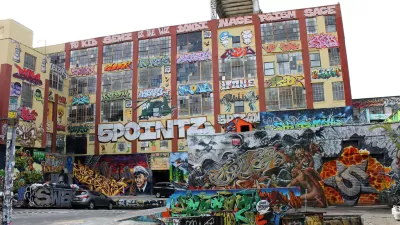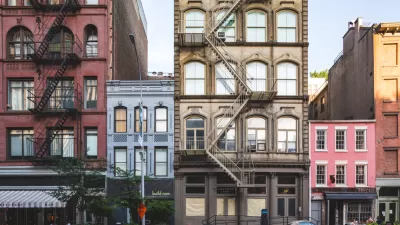Cities like London are losing their creative edge because the small music venues that foster it are being pushed out.

Forty-three percent of London's live-music venues have closed over the past eight years, according to the Music Venue Trust. David Pollock argues that new noise and security regulations being imposed at small venues across London are placing a “stranglehold” on a vital part of the city's ecosystem. While large arenas thrive, they do not foster the kind of artistic innovation and community that occur at small-capacity dives.
It's like knocking down a mountain because it blocks your view, without realizing it's a thing of beauty," says the veteran doorman of Soho's 12 Bar Club in a documentary about the 20-year old small music venue in bohemian Tin Pan Alley.
As soon as you take the edge away from an area, everyone disappears. All you're left with is bored-looking tourists," says the 12 Bar manager.
Tourists and luxury apartment owners seem to be the primary consumer markets targeted for reconstruction projects in neighborhoods like Soho. Long-time Soho resident Colin Vaines describes the transformation. "There are men in hard hats clutching power drills and unloading truckloads of scaffolding, as what seems like virtually every other building is refurbished and turned into luxury flats, priced at a level only overseas investors are likely to be able to afford, with yet another 'artisan' tapas bar, bubble tea lounge, or (insert vacuous hipster gimmick restaurant idea here) at street level."
The decline of small clubs in many of the world's great musical hubs has given rise to the Music Cities Conference, an annual one-day meeting focused on the relationship between city planning and the music industry. The goal is to highlight the strategic role that the music industry can play in improving city life. From venue and community space development to education, employment, event provision, licensing, regulation and demographics, city tourism, soft power and brand development, music industries impact a number of issues prevalent in city planning, strategy, regulatory and legislative aspects," the organization's website explains. The second annual meeting will be held next month in Washington, D.C.
One legislative proposal on the table is the “agent of change” principle, which the Australian city of Melbourne adopted last year. The rule reassigns the onus of environmental mitigation to the incoming occupant instead of the existing occupants. This means that developers choosing to build housing units near a noisy club are responsible for mitigating noise pollution, and not the other way around. Planning Minister Matthew Guy calls it far and away the strongest planning regulatory reform in Australia that protects existing live music venues."
FULL STORY: The slow death of music venues in cities

Planetizen Federal Action Tracker
A weekly monitor of how Trump’s orders and actions are impacting planners and planning in America.

Congressman Proposes Bill to Rename DC Metro “Trump Train”
The Make Autorail Great Again Act would withhold federal funding to the system until the Washington Metropolitan Area Transit Authority (WMATA), rebrands as the Washington Metropolitan Authority for Greater Access (WMAGA).

The Simple Legislative Tool Transforming Vacant Downtowns
In California, Michigan and Georgia, an easy win is bringing dollars — and delight — back to city centers.

The States Losing Rural Delivery Rooms at an Alarming Pace
In some states, as few as 9% of rural hospitals still deliver babies. As a result, rising pre-term births, no adequate pre-term care and harrowing close calls are a growing reality.

The Small South Asian Republic Going all in on EVs
Thanks to one simple policy change less than five years ago, 65% of new cars in this Himalayan country are now electric.

DC Backpedals on Bike Lane Protection, Swaps Barriers for Paint
Citing aesthetic concerns, the city is removing the concrete barriers and flexposts that once separated Arizona Avenue cyclists from motor vehicles.
Urban Design for Planners 1: Software Tools
This six-course series explores essential urban design concepts using open source software and equips planners with the tools they need to participate fully in the urban design process.
Planning for Universal Design
Learn the tools for implementing Universal Design in planning regulations.
Smith Gee Studio
City of Charlotte
City of Camden Redevelopment Agency
City of Astoria
Transportation Research & Education Center (TREC) at Portland State University
US High Speed Rail Association
City of Camden Redevelopment Agency
Municipality of Princeton (NJ)





























